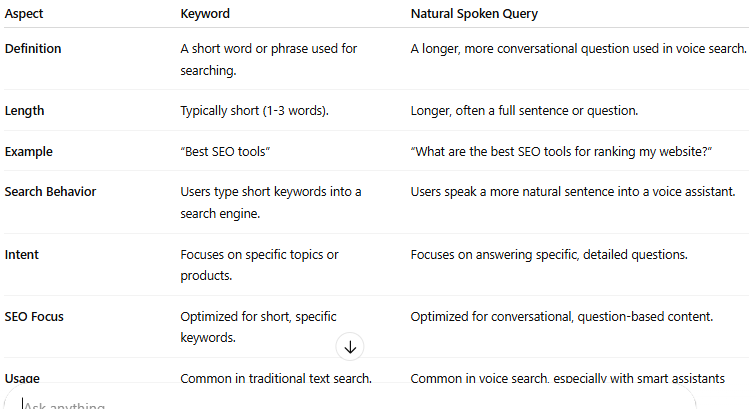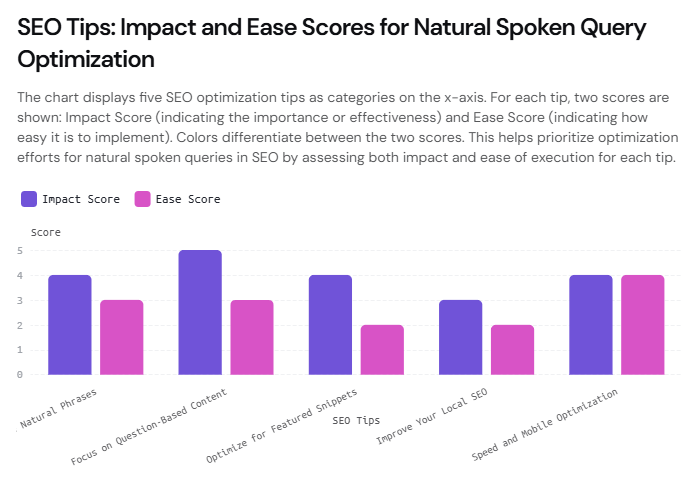Why Should You Optimize for Natural Spoken Queries in SEO?
SEO is always changing, and it’s important to stay updated. One of the newer trends is Natural Spoken Queries in SEO. Do you use voice search on your phone or smart speaker? If so, you’re not alone. More people are asking their devices questions instead of typing.
But why does this matter for your website? How can you make sure your site shows up when people speak to their devices? In this article, we’ll explain Natural Spoken Queries in SEO and give you simple tips on how to make your website ready for this change.
What Are Natural Spoken Queries in SEO?
Let’s start by understanding what Natural Spoken Queries mean. These are questions that people ask voice assistants like Siri, Google Assistant, or Alexa.
When people search on Google, they usually type short phrases like “best SEO tools.” But when they use voice search, they ask longer questions like, “What are the best SEO tools for my website?“
The main difference is that Natural Spoken Queries are more like normal conversation. It’s not just one or two words. These queries are longer, and you need to make sure your website answers them clearly.
Why Should You Focus on Natural Spoken Queries in SEO?
Optimizing for Natural Spoken Queries is important for several reasons:
1. Voice Search Is Growing Fast
More and more people are using voice search. In fact, it’s expected that most homes will have smart speakers by 2025. As this grows, it’s important to make sure your website is ready for voice search queries.
2. People Ask Longer, More Detailed Questions
When someone uses voice search, they usually ask full questions. Instead of typing “SEO tools,” they’ll ask, “What are the best SEO tools to help me rank higher?”
By focusing on Natural Spoken Queries and answering full questions, you give your audience what they need. This can help you rank better and get more traffic.
3. Featured Snippets Can Help Your SEO
Have you ever noticed how voice search often reads out an answer directly? That’s called a featured snippet, and it’s important for SEO. If you can get your website into these snippets, it will help your website show up in voice searches.

Key Benefits of Optimizing for Natural Spoken Queries in SEO
Now, let’s talk about the benefits of focusing on Natural Spoken Queries in SEO.
1. Better User Experience
When you optimize for Natural Spoken Queries, your website becomes easier to understand. Users will get the answers they need in a clear, natural way. Isn’t that the goal of any website?
2. More Visibility
If you use longer, conversational phrases in your content, your chances of ranking for voice search increase. This can drive more people to your website, especially those using voice search.
3. Better Local SEO
A lot of people use voice search to find local businesses. For example, someone might ask, “Where is the closest coffee shop?” Optimizing your website for local SEO will help you show up in these searches and bring in more local customers.
4. Stay Ahead of Your Competitors
Many businesses haven’t adapted to voice search yet. If you optimize for Natural Spoken Queries, you will be ahead of the competition, which can help your business grow.

Ready to get started? Here are some simple tips to help you optimize for Natural Spoken Queries in SEO:
1. Use Natural Phrases
People speak in full sentences, so your content should reflect that. Instead of using only short keywords like “SEO tools,” try longer phrases like, “What are the best SEO tools for my website?” Think about how people would speak to a voice assistant and use those phrases.
2. Focus on Question-Based Content
Most voice searches are questions. So, try to create content that answers common questions. For example, instead of just writing “SEO Tips,” you could write, “What are the best SEO tips for beginners?”
3. Optimize for Featured Snippets
To appear in featured snippets, your content should directly answer common questions. Use simple formats like bullet points or numbered lists. This makes it easier for Google to pull your content as a featured snippet.
4. Improve Your Local SEO
A lot of voice searches are local, like, “Where is the nearest restaurant?” Make sure your website is optimized for local SEO by including location-specific keywords. Update your Google My Business profile regularly to improve local rankings.
5. Speed and Mobile Optimization
Most voice searches are done on smartphones. So, your website should be mobile-friendly and load quickly. A slow website can hurt your rankings and make visitors leave.

The Future Is Voice Search—Are You Ready?
Optimizing for Natural Spoken Queries in SEO is not just a trend—it’s the future. As more people use voice search, your website must adapt. By focusing on natural language, answering questions clearly, and improving local SEO, you can increase your website traffic and stay ahead of your competitors.
So, are you ready to optimize for voice search? Are you ready to start using Natural Spoken Queries in your content? The future of SEO is already here, and it’s time to take action.
How ACSIUS Can Help You Optimize for the Right Natural Spoken Queries and Keywords for Better Website Ranking
At ACSIUS, we understand that SEO is not just about picking random keywords, but about creating content that speaks to your audience—literally. With the rise of voice search and AI-driven technologies, optimizing for Natural Spoken Queries is more important than ever. But how do you ensure your website is ranking for both traditional keywords and more natural, conversational search queries? That’s where we come in.
Here’s how ACSIUS can help you create a smart, effective SEO strategy that drives higher rankings, increased traffic, and better user engagement.
How We Do It:
Comprehensive Keyword Research: We perform in-depth research to identify relevant and high-volume keywords for your business.
Competitor Analysis: We analyze what your competitors are ranking for and find keyword gaps that you can capitalize on.
User Intent Mapping: We analyze your audience’s search intent and create a list of keywords that align with their needs.
FAQs about Natural Spoken Queries
[sp_easyaccordion id=”11969″]
